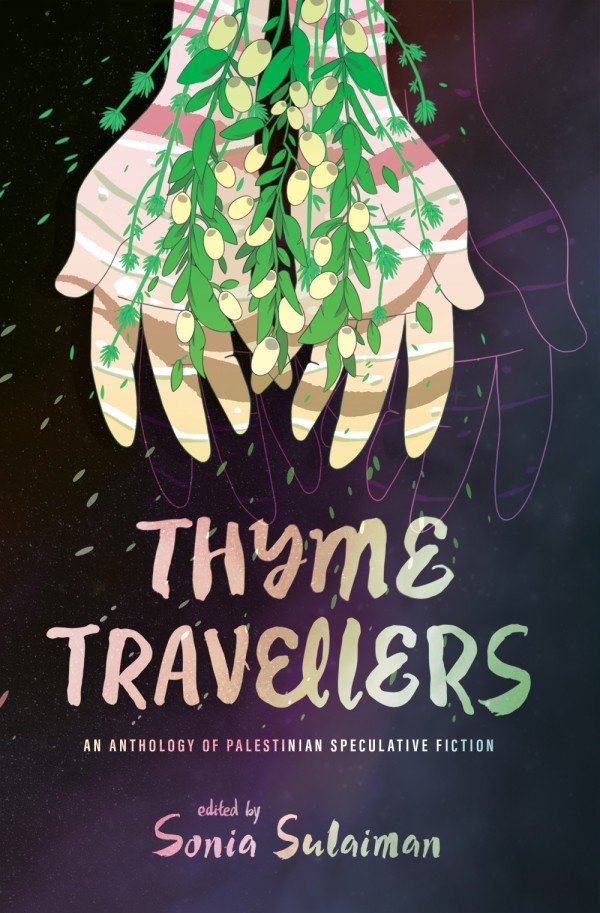We Are Not Our Catastrophe: Review of Thyme Travellers: An Anthology of Palestinian Speculative Fiction
Thyme Travellers, ed. Sonia Sulaiman
Fernwood Publishing, 2024. $24 CAD
Order a copy from Fernwood Publishing
Thyme Travellers: An Anthology of Palestinian Speculative Fiction collects fourteen stories by new and established writers from the Palestinian diaspora. Edited by Sonia Sulaiman, these stories imagine new worlds and confront the reality of our own. Individually, these stories are thought-provoking and sincere. Together, they beautifully explore Palestinian identity and resistance, and offer readers a chance to reflect upon the present moment and what we want the future to look like.
This book is unique from other anthologies I’ve read because it feels like the stories are in conversation with each other. When one character in a story feels like they won’t belong in their homeland, another is welcomed with open arms. When one character can’t break free from her complicity in a rigged system, other characters are breaking cycles. When an elderly character hides her queerness for most of her life, a young queer woman in another story is greeted by a memory of her queer grandmother. These stories are unified by their overarching questions about belonging, resistance, change and hope, and highlight a multitude of experiences and emotions.
Jumaana Abdu’s heartfelt story “Down Under” features two Australian women digging their way to Palestine. One of them feels disconnected from her heritage and questions whether she belongs. Sara Solara earnestly tells a story about a young woman who echoes these feelings as she returns to a free Palestine in her story “In the Future, We Can Go Back Home.” These stories speak to experiences of belonging and unbelonging, and are a reminder that some connections will always remain despite distance.
Nadia Afifi’s “The Generation Chip” acknowledges this distance too, and it is tender in its exploration of belonging through a group of siblings coming together after their grandmother leaves them her dreams and memories in her will. This story delves into the concepts of legacy and memory, and explores the powerful ways remembering can provide strength, hope, and connection. In Sonia Sulaiman’s story “The Forty,” remembering is also an act of survival. Sulaiman lovingly writes about a character who goes on a pilgrimage and longs to be remembered because she wants future generations to know that she and her people existed. Both stories demonstrate how remembering where we come from helps keep the past and our ancestors alive.
Other stories draw attention to the dehumanization of Palestinians. Ziyad Saadi’s “The Third or Fourth Casualty” features a group of boys who swim in the sea until they drown. It sharply reflects on the apathy of the rest of the world in response to violence against Palestinian children. In “The Centre of the Universe,” a story about a simulation wherein a side character only gets attention when the main character acknowledges her, Nadia Shammas brilliantly illustrates the way the world only pays attention to Palestinian pain. “Orlando’s Wolf” is a fiery story by Rasha Abdulhadi that follows a rebel who seeks vengeance against the invaders who colonized their land. These powerful stories respond to white supremacy and colonialism, and highlight the importance of resisting these systems.
Several stories in this anthology also discuss change. In “Cyrano de AI,” Karl El-Koura thoughtfully explores experimental AI implants and a character’s disinterest in ever turning his implant off. Elise Stephen’s “Remembrance in Cerulean” is fascinating and shows a human and an alien forming a connection despite their cultures being at odds. These stories feature characters who break cycles and acknowledge that change needs to happen to create a better future.
Conversely, J.D. Harlock’s “The Frontrunner” is a compelling story about a character who can see all possible futures, but is part of an organization that uses this ability for nefarious purposes. The organization claims to be serving the greater good, but who is this good for? Similarly, “A Table Set for Two” by Emad El-Din Aysha is an intriguing story that explores history and consequences. It follows a researcher who travels through time to change a moment in history, but this has an unexpected ripple effect. These stories illustrate the importance of acknowledging our complicity and mistakes as a step towards creating change.
The remaining three stories explore hope and truth. Samah Serour Fadil’s story “Gaza Luna” embodies hope and resistance as a man attempts to fly a rocket to the moon. Rana Othman balances playfulness and despair in her story “Soul Searching,” which follows a young girl working through grief and learning about empathy. Layla Azmi Ghoushey’s “The Heart Knows the Truth” explores an alternate dimension Palestine with a gentle curiosity. The characters in these stories face the truth of their realities and in doing so, find hope, solace, and a way to move forward.
In a world that seeks to erase Palestine and Palestinians, this book pushes back. Sonia Sulaiman writes in her story, “The Forty,” “We are not our catastrophe. Never were.” (100). Not only is this anthology proof of that, but this is something that Palestinians show us every single day. These stories are grounded in truth and reckon with the real world, and they also imagine different futures, ones of belonging, love and hope. Thyme Travellers is a necessary and important read, but it’s not just a book—it’s a call for readers to pay attention, resist colonialism, and work towards collective liberation. May this book inspire you to do just that. Free Palestine.
Helena Ramsaroop (she/her) is an Indo-Guyanese reviewer and freelance editor from the Greater Toronto Area. She is the recipient of the 2024 Claudette Upton Scholarship. Her reviews can be found on Instagram @HelenaReadsBooks and on her website.


